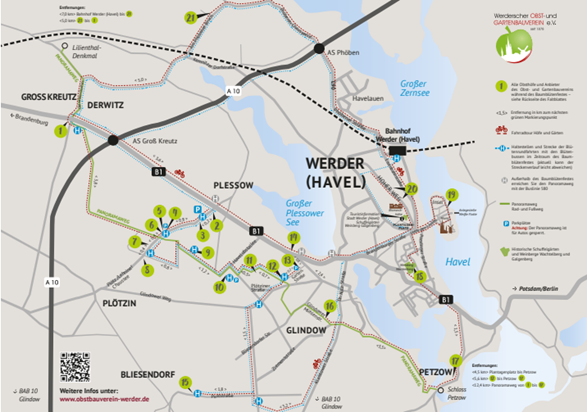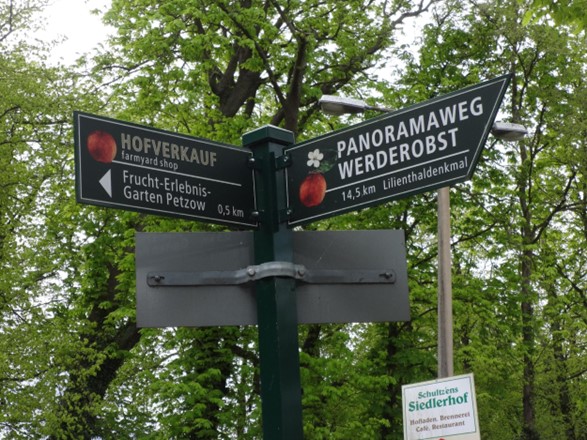“Age and glasses of wine should never be counted.”
(Unknown)
The story of the event or experience, how it started and evolved to its current form, when it started, what is unique about it, how popular the experience is with locals/visitors to the area etc…
Ever since Frederic the Great encouraged the planting of fruit trees, and corn, at the expense of vines in the late eighteenth century, the town of Werder and the surrounding area have been famous for their apple, pear and cherry orchards. On 18 March 1879, the fruit-growers’ association of Werder decided to announce the tree-blossoming in its orchards in Berlin newspapers to attract visitors and to promote the sale of their produce. In early May the first trains started to arrive with day trippers keen to enjoy wine, coffee and cakes in the blooming orchards. Over time, the event turned into a popular festival for the next hundred years. It then suffered a decline after the then East German authorities restricted the sale of fruit wines in gardens and on farms. The tradition was, however, revived in 1989, attracting up to half a million visitors in the years ahead of the Covid-19 pandemic. In 2004 the first part of a nature and educational trail passing through the orchards and linking local farms was inaugurated and subsequently extended in 2013. The trail starts at the hamlet of Petzow, just outside Werder, which boasts of a neoromantic village church and a mansion that combines elements of Moorish and Tudor-style architecture, both built after plans by the Prussian architect Karl Friedrich Schinkel, and a small museum of local history.
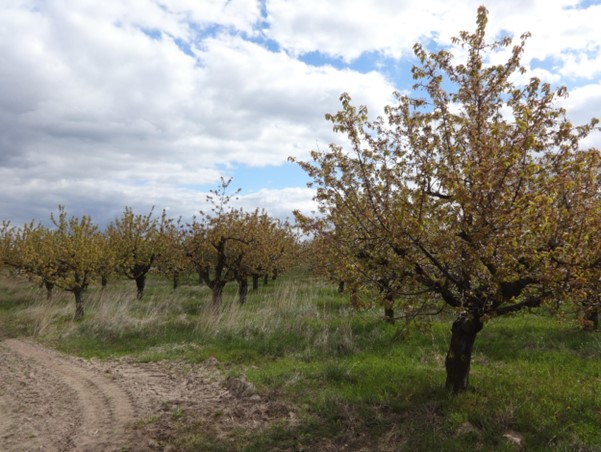
Running in an northwesterly direction, it passes through the Glindow Alps, a hilly area created by clay winning and now a nature reserve, and its brickworks museum to reach the main local orchards before arriving at Derwitz and its Otto-Lilienthal-Museum, dedicated to the German pioneer of aviation, who nearby undertook his first successful flights with the glider Derwitzer. The trail ends at the village of Krielow. Nowadays, groups of visitors and locals on foot or on byke can be observed on the trail as soon as the fruit trees start blooming in spring. The trail does not only make for a pleasant walk or ride but also offers numerous possibilities to buy or sample local products and to get to know more about them, as producers along with the local fruit-growers’ and horticultural association have made increasing efforts to offer these and other activities. The tour can be combined with a visit to the town of Werder, which has an open-air farmers’ market, the Frischemarkt, and a small fruit-growing museum.
Tell the customer what they will get and why they should include this experience in their itinerary.
What food/beverage is included, what producers they will meet,
The now 22km-long Panoramaweg Werderobst is a popular destination for day excursions from Berlin, Potsdam and neighbouring regions.
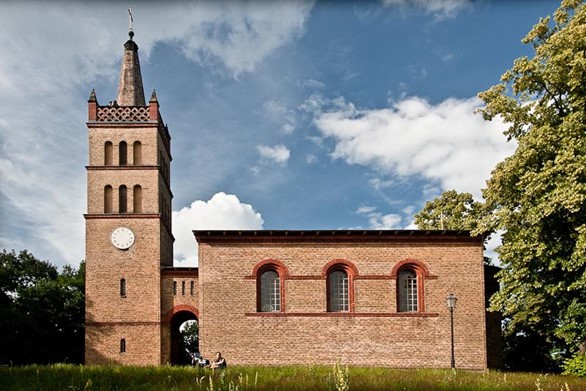
Among the educational stations of the trail is a 6,500sqm orchard where eight historical apple varieties are being cultivated; a chart explains their history and their specific qualities. At another, visitors can learn more about local cherry varieties. Near one of the vineyards, the curious will find information about some 140 grape varieties along two small trails. During the season, many producers open their farms, vineyards and gardens to visitors either on a regular basis or during designated days. Other possible stations are the local farm shops and food manufacturers that sell a large variety of jams, vinegars, chutneys, wines, liqueurs, eaux de vie and whatever other products are made from local fruit. In summer, strawberry and blueberry fields are open to self-pickers.
In the recent past, viticulture has been revived, and one of the local wine producers runs a seasonally open wine tavern, the Weintiene, at the Wachtelberg vineyard, where locally produced wines and simple dishes are on offer. During the grape harvest, between late August and early October, the tavern serves federweißer (a partially fermented young wine) and onion tart. At Petzow, on the shore of the Glindow lake, visitors of Christine Berger’s sea-buckthorn farm are invited to watch a transparent jam production, take part in a guided tour, visit the sea-buckthorn-and-wild-berries and herbal gardens, browse at the farm shop or enjoy the view from the café Orangerie, which also serves snacks. At the Glina distillery, which produces whisky, gin, fruit wines, mulled wine, liqueurs and eaux de vie sold in the farm shop, a guided tour lets participants observe the differents stages of whisky production at a transparent distillery and taste the results.
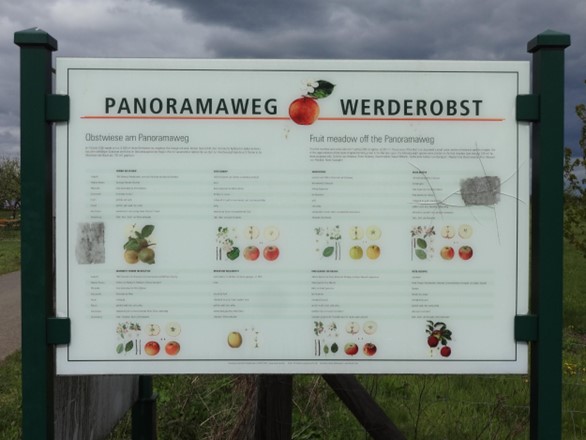
The main public event in the area is the Blossoming-Tree Festival (Baumblütenfest) in Werder, which takes place on the first weekend of May. But throughout the season there are several other smaller festivals, such as the Apple Festival, the Galgenbergtag, organised by the fruitgrower’s and horticultual association, and which includes a produce competition and local excursions, and the Schlachtefest, with meat and sausages from freshly slaughtered pigs. For the interested there are also occasions for hands-on courses in fuit-tree and vine pruning.
(17) Sea-buckthorne farm Christine Berger and here
Glina whisky and gin distillery
(18) Weinbau Dr. Lindicke
(2) Obsthof Lindecke
Fruit-growers’association Werder and here
(9) Biohof Werder
(1) Derwitzer Hof
(10) Zuckerbaum (7) Van Dam’s Kirschenhof
The 22km-long Panoramic Trail Werderobst extends from the town centre of Werder (for cyclists) or, for those on foot, from the hamlet and castle of Petzow, to the southeast of the town of Werder in northwesterly direction to the village of Krielow. On foot the excursion lasts about four to five hours, on bike two to three hours. By train, Petzow can be reached from Berlin’s central railway station in about one hour by taking the regional train RE1 to Werder, then the busline 631 to the stop Post and finally the busline 636 to the palace garden of Petzow. The return trip starts in Krielow by busline 637 to Groß Kreutz where the regional train RE1 takes the visitor back to Berlin. Both end points are connected by Bundesstraße 1 (federal highway B1) to Berlin.
Find us here:
Panoramic Trail Werderobst: https://www.werder-havel.de/en/tourism/discover-werder/on-the-bicycle.html
The local tourist information in Werder is open from 15 April to 15 October 10am–5pm on weekdays, 1–5pm on Saturday and Sunday and during the rest of the year closes at 4pm.
Lindow House
Plantagenplatz 9
14542 Werder (Havel)
E-mail: tourism@werder-havel.de
Phone: +49 33 27 783-372/-373
An English-langage flyer with a map is available here.
Panoramic Trail Werderobst with main stations during the 2020 Tree-Blossoming Festival
(Copyright: Obstbausverein Werder e.V.)
